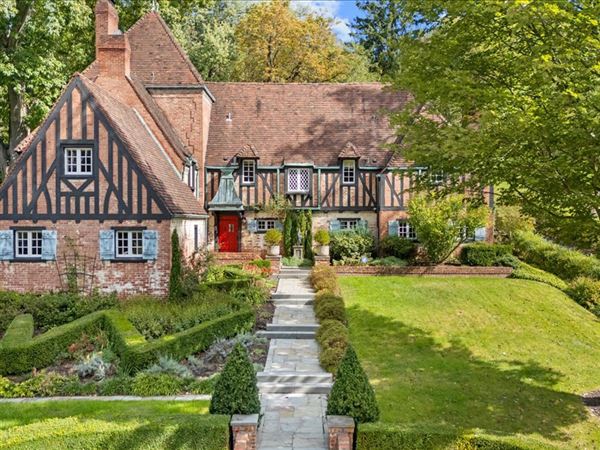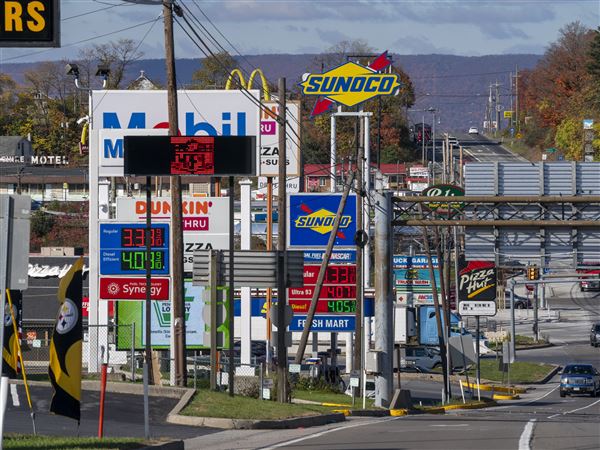Green Hills is clearly no refuge for the superwealthy. A borough dotted with trees and tucked along a winding stretch of Route 18 in Washington County, it lacks locally maintained roads, a fire company and a police department. The only landmarks are a horse farm, a pond and an 18-hole golf course.
But thanks to a statistical anomaly, the four families who live there can claim residency in the state's richest community.
Green Hills' $124,279 per capita income is significantly higher than Pennsylvania's more traditional enclaves of wealth -- No. 2 is Fox Chapel ($80,610), No. 3 is Sewickley Heights ($79,541), No. 4 is Edgeworth ($69,350) and No. 5 is Thornburg ($57,674), according to data pulled from the U.S. Census Bureau by University of Pittsburgh economist Chris Briem.
Green Hills' size has a lot to do with this -- there were only 18 people living in Green Hills at the time of the U.S. Census survey, and only 16 now, thereby skewing the results. Another contributing factor is that two of the 16 are Washington County businessmen Paul Songer Sr. and John Chapman, both of whom own companies in the area, had decades to accumulate their wealth and most likely push the borough's income totals higher. Of the local families surveyed for the 2000 U.S. Census, half in Green Hills had incomes of $200,000 or more while the other households landed somewhere between $25,000 and $34,999.
"It's happenstance," said borough solicitor James McCune.
Thus, the label of wealth is a sensitive topic locally, with residents arguing that the U.S. Census ranking does not reflect the local lifestyle or mind-set.
The number is "wildly out of whack," said Mr. Songer, chief executive officer and chairman of Cecil-based Songer Steel Services, a company that handles plant renovations and construction for the steel industry.
Added Green Hills Mayor Terry George: "It's just that way because of population .... We are a small, private borough."
Mr. McCune argued that Green Hills "is not an enclave" and "it's not a gated community." In fact, everyday existence "is no different than your lifestyle or my lifestyle."
Green Hills began as an experiment in direct democracy initiated by builder Vernon Neal, who agitated for the borough's creation once the dry township of South Franklin denied his Lone Pine Country Club a liquor license. Mr. Neal's secession movement aroused the ire of South Franklin's supervisors and a court challenge but ended with Green Hills' successful incorporation in 1978 -- well before the state Legislature cut off such an option by ruling that new boroughs must have at least 500 residents.
The founder is now dead, but Mr. Neal's Lone Pine clubhouse (an old barn) is still the center of civic life in Green Hills, serving as voting center (the seven borough voters are all registered as Republicans), meeting house for borough council (overseen by three of the seven registered voters) and site of political gossip. When longtime Lone Pine golf pro Terry George ran for mayor in 2005, he spent no money and never put out a sign. The voters, who caught word of his candidacy during casual conversation at the club, elected him unanimously, 7-0.
"We have no term limits," he joked. "I might be in there in perpetuity. Who knows?"
Three of Green Hills' four families live in houses bordering the golf course -- now owned by Paul Songer Jr., who lives in Florida but maintains an apartment inside a former Lone Pine maintenance shed.
The mayor and his wife, Janet, have one house they share with Janet's son; Thomas and Cindy Songer and their three kids have another house; and then there is a 10-acre tract occupied by Paul Songer Sr. and his wife, Shelley.
The elder Mr. Songer lives in the house originally belonging to Mr. Neal, the borough founder. When Mr. Neal died, the golf course and home were sold to Mr. Songer, who subsequently sold the course to his son Paul Jr.
"It's probably the quietest community in Pennsylvania," said Paul Jr. "There is not really much that happens there other than the golf club."
A horse farm belonging to John and Alice Chapman also is visible from Lone Pine and Route 18.
Mr. Chapman, who has been in the borough from the very beginning, is the longtime CEO of Chapman Corp., a Washington-based provider of construction services to industrial and commercial clients.
Mr. Chapman founded the company in 1945 after completing studies in engineering at the University of Pittsburgh and the former Carnegie Institute of Technology. The company's sales averaged $72 million between 2002 and 2006, according to Chapman's Web site.
Mr. Chapman could not be reached for comment.
Because of Green Hills' unusual size, it has attracted its share of reporters and curiousity-seekers over the years. And the tag of wealth is a concern to residents worried about privacy and safety.
These are "private people," Mr. George said.
What could alter Green Hills' unusually small status -- and perhaps its statistical superiority on the list of the state's wealthiest communities -- is a plan for new housing on a 147-acre tract carved from the Lone Pine golf course. Builder Jeff Thomas recently purchased the land from Paul Songer Jr. for $1.7 million, according to records, and the plan is for 458 single-family homes, townhouses and duplexes, along with a pool and swim club. Mr. Thomas recently won preliminary approval from the state for a new sewage treatment plant and hopes to begin construction this year.
The new homes and residents "could change [Green Hills] radically," said Mr. McCune, the solicitor. The new development may lead to a functioning municipal government with enough revenues to plow the streets and provide necessary services -- the borough currently contracts with South Franklin Township for its fire protection.
"Big things might happen in the borough shortly," said Mr. George, the mayor. But, "it will be fine."
Mr. Thomas, the developer, conceded that the tag of high per-capita wealth might help from a marketing standpoint.
"God bless that," he said.
But no one else in the borough appears to be reveling in the status of southwestern Pennsylvania's -- and the state's -- richest community, on a per capita basis.
"I'm not sure if anyone in Green Hills is even conscious of it or aware of it," Mr. McCune said.
"And if they were, I am not sure they would care."
First Published: January 27, 2008, 10:00 a.m.
















